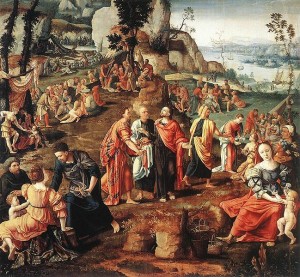 Only one miracle of Jesus is recorded in all four gospels — the multiplication of the loaves and fishes.
Only one miracle of Jesus is recorded in all four gospels — the multiplication of the loaves and fishes.
I once heard a homilist give what he said was the real meaning of the story: the people in the crowd took out food they were hiding under their cloaks and shared it. Jesus’ preaching inspired the melting of selfishness, and this was the true miracle according to this preacher.
My kids would call such preaching hopelessly lame!
This was a needy crowd. They could not feed themselves or each other. They could not heal themselves or each other. Jesus was moved with pity and was ready to provide them all that they needed. The apostles wanted to send them away to fend for themselves.
And this hits upon the grain of truth contained in the lame interpretation we’ve just mentioned. Though this story is about truly supernatural, miraculous action, it is not about God creating something out of nothing. He says to the apostles “you give them something to eat yourselves.” He had to be joking, they must have thought to themselves. They had nothing, or almost nothing. Just five loaves and two fish — scarcely enough to serve as an appetizer for themselves, never mind the crowd. But the apostles sheepishly complied when Jesus ordered that they surrender their scanty food supply. He blessed this meager offering and the miracle happened. It was not only enough, but after thousands had eaten their fill, there was more left over than what they’d started with in the first place.
It never ceases to amaze me at how much energy we put into making excuses. “I don’t even earn enough to feed my own family, how can I be expected to give?” “I haven’t studied the faith enough to be a religious education teacher.” “I trip over my words when I try to explain my faith — I’ll just evangelize through good example.”
Our financial resources, talents, and holiness are clearly inadequate to meet the needs of a hungry and confused world. But what else is new? This gospel commands us to offer these resources anyway, trusting that He will multiply them. Who could have guessed how God would multiply the loaves and fishes offered by an Albanian nun named Teresa when she walked into the slums of Calcutta? Imagine if she had said “no, Lord, this is beyond me.” Imagine if Peter had not reconsidered after saying, “Leave me, Lord, for I am a sinful man” (Luke 5:8). Imagine if the apostles had saved the five loaves and fish for themselves instead of wasting them on a crowd that wouldn’t have been satisfied with them anyway.
“But,” you may protest, “isn’t this miracle story about the Eucharist?” Absolutely. In the Eucharist we bring the very ordinary work of our hands, bread and wine, and join to this the offering of our very ordinary lives. Through the invocation of the Spirit and the Word of God, this offering is transformed into the Body and Blood of Christ, the Bread of Life and the Cup of eternal salvation. We offer him the work of our hands and our broken humanity, and he transforms these things into perfect humanity and life-giving divinity. And with this he not only feeds us but empowers us to feed the whole world.
This transformation, this multiplication, is a supernatural marvel that is the source of other marvels. In fact, if we to unpack just a fraction more of the miraculous power contained in the Eucharist, we, the Church and the world would be forever different.
And that’s why Pope John Paul II proclaimed a Year of the Eucharist that proved to be the climax of his pontificate — that in meditating more on this astounding gift, we would be prompted to quit holding back. He has given all and asks for all in return. Not so he can take it away, but rather so that He can multiply it.



